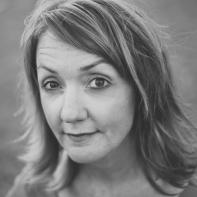These words open our work, even if they’re not explicitly stated. Our fiction holds characters that come from all types of homes. We conjure blended families, multi-generational households, ones that contain fostered and adopted children; we’ve got queer families, racially diverse backgrounds, and created homes with loved ones of our character’s own choosing. There’s no limit to what we might come up with. Our characters are defined by these families. Their backgrounds tell us how they overcome crisis and trauma, or how they ultimately succumb to it. Even if we’re not writing about a character’s family, it’s always there, lurking in the background like a horrible upcoming family reunion. Characters come with domestic baggage.
Here’s where things get tricky. The intimate backgrounds of these characters can often extend from our own. Sometimes this is on accident – perhaps a family legend falls into the narrative; the time your father angrily emailed KFC because he hated their new commercials – but it can also be done with malice. Conjuring stories gives us a wild kind of freedom, and how nice would it be to get that thing on paper that’s been bothering you for years?
 At a recent Tin House workshop, Dorothy Allison talked about writing truth in fiction. She discussed its hardness and its necessity; told us all to “write like a hammer.” These realities struck the audience silent – we’re all attempting to create something greater than ourselves in our work, something that will stand as testament that we were here and took up space. Dorothy expounded on this concept, shouting that it didn’t matter if something honest was hard to hear, because “it’s true, therefore I have the right to scare the shit out of you with it.” Everyone nodded in agreement; after all, the scary stuff is where we find the real meat of our work. After saying this, however, her tone softened. She stared out at the audience, made eye contact with nearly everyone, and said, “but truth is not a defense against destroying people.”
At a recent Tin House workshop, Dorothy Allison talked about writing truth in fiction. She discussed its hardness and its necessity; told us all to “write like a hammer.” These realities struck the audience silent – we’re all attempting to create something greater than ourselves in our work, something that will stand as testament that we were here and took up space. Dorothy expounded on this concept, shouting that it didn’t matter if something honest was hard to hear, because “it’s true, therefore I have the right to scare the shit out of you with it.” Everyone nodded in agreement; after all, the scary stuff is where we find the real meat of our work. After saying this, however, her tone softened. She stared out at the audience, made eye contact with nearly everyone, and said, “but truth is not a defense against destroying people.”
I went home from Tin House and thought about this a lot. I write fiction and essays, and I admit that sometimes the line between those two gets a little smudged. So much of what I am is because of who I was; the people who raised me and what my home was like. I write about Florida, I write about my queerness, and I write about the church. I write to know who I am now, and I keep writing because I am never the same person as I was the day before. My family is part of that process because I am incapable of maintaining an identity separate from them. It would be tantamount to carving up my body and saying, well, I am mostly just this thigh meat and the neck part. It can’t be done.
Fiction isn’t truth, but it contains elements of it. How we write is informed by our environment. I look to my parents and their traditions, and sometimes I say, there’s fodder here for something that once hurt me. Writing about it helps me look at all the sides of these issues – I can look at how they informed me, but I can also better see my own role in them: how I dealt with them at the time, what I took away from those experiences. Coming back from the work shop, I look at these instances in my writing and ask: what’s the ultimate cost of disclosing them?
Dorothy closed out her work shop panel by telling us that “you are trying to put something on the page worth what it cost you to put it on the page.” For myself, I took this to mean that my writing is not a way to exorcise demons. It is a way to confront established ideas and reassess them. In my quest for honesty in my work, I am saying that I require honesty from myself before I expect it from anyone else. I am saying that in order to write, I must look at the world I inhabit and understand that I am not the god of it. I live here, but so does everyone else. What I must do in my writing is take a hard look at how I write about family and decide if it rings true; not insert harmful narrative because I want to push it away from me. That’s the most truthful way for me to write fiction.
And yes, my father did email KFC – but he won’t mind that I told you about it. Just try not to bring up the Colonel; he’s still a little touchy about it.
 This Tuesday, we are proud to feature a podcast of SR contributor Laurie Uttich reading her poetry from Issue 17.
This Tuesday, we are proud to feature a podcast of SR contributor Laurie Uttich reading her poetry from Issue 17.